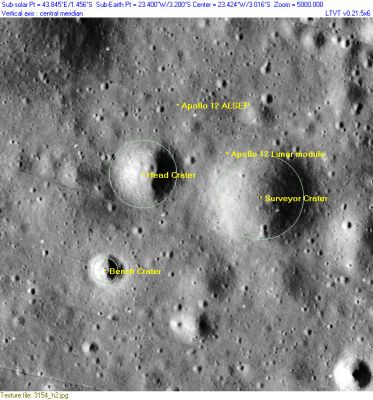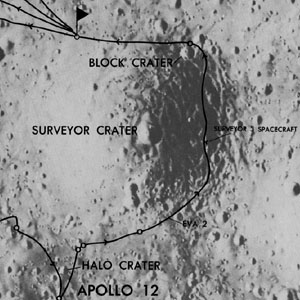Difference between revisions of "Surveyor"
| Line 6: | Line 6: | ||
|- | |- | ||
| | | | ||
| − | [http://www.lpod.org/coppermine/displayimage.php?pid=5770&fullsize=1 [[Image: | + | [http://www.lpod.org/coppermine/displayimage.php?pid=5770&fullsize=1 [[Image:Normal_Apollo%2012%20Landing%20Site%20-%20LO_III-154H2.jpg|external image normal_Apollo%2012%20Landing%20Site%20-%20LO_III-154H2.jpg]]]<br /> |
| | | | ||
[[Image:Apollo_12_Surveyor_crater.JPG|external image Apollo_12_Surveyor_crater.JPG]]<br /> | [[Image:Apollo_12_Surveyor_crater.JPG|external image Apollo_12_Surveyor_crater.JPG]]<br /> | ||
Latest revision as of 02:18, 16 April 2018
Contents
Surveyor (Apollo 12 site craterlet name) (Surveyor 3 site)
|
Lat: 3.01510°S, Long: 23.41946°W, Diam: 0.158 km, Depth: km, Rükl: 42 | |
Images
LPOD Photo Gallery Lunar Orbiter Images Apollo Images
- Mike Constantine's assembled panorama shows the Surveyor crater at left, LM Intrepid and parabolic antenna near it, flag at centre, and the TV-camera at right. At far left is Surveyor 3 noticeable, sitting at the shadowed inner slope of Surveyor crater.
- Officially there are no color photographs of Surveyor 3 on the lunar surface. Careful investigation however reveals more than one color-Hasselblad photograph on which Surveyor 3 is seen, sitting at the eastern shadowed inner slope of Surveyor crater. These photographs are:
Magazine 46/Y:
- AS12-46-6740 shows LM Intrepid and a lot of spectral-colored catadioptric effects, with the distant Surveyor 3 at right, on the shadowed slope.
- AS12-46-6741 (rightward of 6740) shows Surveyor 3 at left.
- AS12-46-6746 shows it too.
- AS12-46-6769 is perhaps the best one of all color photographs of Surveyor 3. The bluish colored pentagon and the two bright "pseudo-suns" are catadioptric effects in the Hasselblad camera's lens-system (and NOT "floodlights in the studio").
Magazine 47/V:
- AS12-47-6948 shows Surveyor 3 a little to the right of the bluish colored catadioptric effect's lower half.
- AS12-47-6949 shows Surveyor 3 near the photograph's central cross. The Descent Stage of LM Intrepid is seen at left.
- AS12-47-6968 shows Surveyor 3 at left.
- AS12-47-6969 shows Surveyor 3 near the photograph's central cross (a little lower and to the left of it).
- AS12-47-6992 shows Surveyor 3 halfway between the central cross and the photograph's left margin.
- AS12-47-6993 shows Surveyor 3 near the photograph's central cross. The red-colored dot in the black sky (at right) is NOT an "extraterrestrial visitor", its origin is pure chemical, the cause of it is an irregularity in the photographic film.
- AS12-47-6994 shows Surveyor 3 about halfway between the central cross and the photograph's right margin. The two bright "pseudo suns" and the bluish colored "blob" are catadioptric effects in the Hasselblad camera's lens-system. Note the spectral colored "arc" at right, which is also a reflection-phenomenon inside the camera's lens-system.
Research photographs: Danny Caes.
Surveyor 3's tan-like coloration
Note the somewhat tan-like coloration of Surveyor 3 on all of these photographs, a coloration which was also observed by the astronauts during their close-up investigation of the lander (sadly enough, they forgot to take color close-ups of it).
Descriptions of Surveyor 3's tan-coloration are online in Eric M. Jones's Apollo Lunar Surface Journal (ALSJ), and also in the book Die Mondlandung, der Menschheit Grosstes Abenteuer by Herbert J. Pichler (Verlag Fritz Molden, 1970).
- DannyCaes Feb 15, 2009
Maps
(LAC zone 76A2) LAC map Geologic map LM map AIC map
Ewen Whitaker and Surveyor 3
Thanks to Ewen Whitaker, astronauts Charles Conrad and Alan Bean (Apollo 12) landed their Lunar Module Intrepid very near the landingsite of Surveyor 3 at the Surveyor crater which was part of the Snowman (a cluster of small craters more-or-less snowman shaped). Ewen Whitaker discovered the pinpoint spot of Surveyor 3 on Lunar Orbiter photographs. See also the page Apollo 12 Site.
Wikipedia
Additional Information
- IAU page: Surveyor
- The position and diameter in the title line are from Davies and Colvin, who determined the position by scaling from a known point in the Site Traverses Chart which is probably based on Lunar Orbiter III photos.
- The much less precise official data from the IAU Planetary Gazetteer are: Lat: 3.2°S, Long: 23.4°W, Diam: 0.01 km.
Nomenclature
Astronaut-named feature, Apollo 12 site.
LPOD Articles
Bibliography
Harland, David M. 1999. Exploring the Moon (Springer).
Named Features -- Prev: Rima Sung-Mei -- Next: Susan

